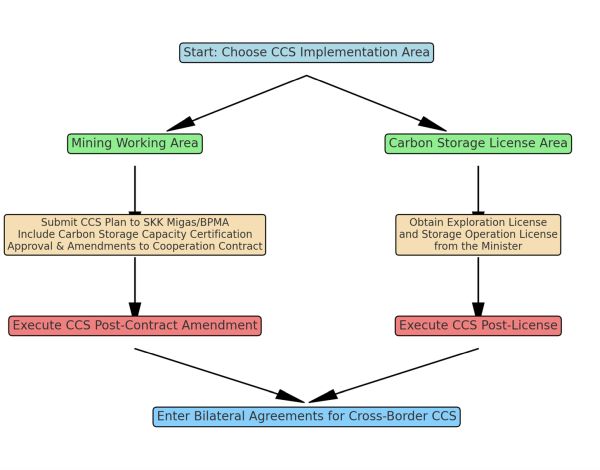- within Energy and Natural Resources topic(s)
- in United States
BACKGROUND
The government issued Presidential Regulation No. 14 of 2024 ("PR 14/2004") that sets the implementation of carbon capture and storage (CCS) in Indonesia. In the regulation, the government provides a legal basis for carbon capture, transportation, and storage activities in Indonesia. In addition, PR 14/2024 also sets the carbon transportation mechanism across countries.
KEY REQUIREMENTS
The Implementation of Carbon Capture and Storage Activities
Carbon capture and storage activities can be conducted not only in a mining working area, where exploration and exploitation activities are carried out (Working Area), but also in a Carbon Storage License Area.1 The implementation of CCS in the Working Area is carried out by the Contractor based on the Production Sharing Contract (or Cooperation Contract) for mining exploration and exploitation activities. While 2 the implementation of CCS in the Carbon Storage License Area is carried out by the license holder based on the Exploration license and Storage Operation License.3
Implementation Of Carbon Capture and Storage Based on Cooperation Contract
To carry out CCS activities in the Working Area based on the Cooperation Contract, the Contractor through Special Task Force for Upstream Oil and Gas (Satuan Kerja Khusus Pelaksanaan Kegiatan Usaha Minyak dan Gas Bumi – "SKK Migas") or the Aceh Oil-and Gas Organizational Body (Badan Pengelola Migas Aceh – "BPMA") according to its authority submits a CCS implementation plan.4 The CCS implementation plan as, must be accompanied by certification of Carbon Storage capacity.5 Implementation of CCS as part of the field development plan or its approved amendments (by the Minister of Energy and Mineral Resources ("Minister") and SKK Migas or BPMA according to their authority), followed up with amendments to the Cooperation Contract.6 The Contractor proposes in writing the approval of the amendment of the Cooperation Contract to the Minister through SKK Migas.7
Implementation Of Carbon Capture and Storage Based on Exploration License and Storage Operation License
The implementation of CCS in the Carbon Storage License Area shall be carried out based on the Exploration License and Storage Operation License issued by the Minister. In issuing the Exploration License and Storage Operation License, the Minister delegates his authority to the minister/head of the agency that organizes government affairs in the field of investment/investment coordination. The Carbon Storage License Area is an area that can be in an open area, mining business license area, and/or Working Area.8
Implementation Of Carbon Capture and Storage Through Storage Operation Licenses and Cooperation Contracts
Execution of CCS implementation in the Carbon Storage License Area is carried out after the Business Entity obtains a Storage Operation License.9 Implementation of CCS implementation in the Working Area is carried out after the Contractor obtains approval of the proposed field development plan or its amendment.10
Economics or Business Scheme
Implementation of CCS carried out based on a Cooperation Contract can be monetized in the form of storage fees and / or other forms; or based on a Storage Operation Permit monetized in the form of storage fees.11 In supporting the implementation of CCS, the Contractor may be granted tax incentives in accordance with the provisions of laws and regulations regarding tax treatment in Upstream Oil and Gas Business Activities and non-tax incentives in accordance with the provisions of laws and regulations.12
All goods and equipment purchased by the Contractor and used directly in the implementation of CCS as the implementation of the Cooperation Contract become state property whose management is carried out based on the provisions of laws and regulations in the field of state property.13
Cross-Border Transportation of Carbon
To facilitate the transportation of CCS operations across countries, bilateral cooperation agreements between countries shall be entered. The cooperation agreement serves as a guideline for all parties to issue recommendations or permits required in the context of cross-border Carbon Transportation in accordance with the provisions of the applicable laws and regulations in their respective countries.14
Economic Value of Carbon
The implementation of Carbon Economic Value from CCS activities is carried out in accordance with the provisions of laws and regulations governing the implementation of Carbon Economic Value.15 Each person in charge of the action shall record and report the implementation of the Economic Value of Carbon from CCS activities in the national registry system for climate change control.16
Administrative Sanctions
Administrative Sanctions imposed in this regulation can be written warnings; temporary suspension of part or all the injection target zone (zona target injeksi/ZTl) exploration activities, carbon storage operations, or carbon Transportation; and license revocation.

Flow Chart: the CCS implementation process in Indonesia
IMPLICATIONS
This regulation is a strategic step towards reducing carbon dioxide emissions and achieving the net zero emission target by 2060 or sooner. This regulation establishes a clear and comprehensive legal framework for the implementation of CCS activities in Indonesia, including the capture, transportation, injection, and safe and permanent storage of carbon dioxide in geological formations.
CONCLUSION
This policy is directed to support efforts to reduce carbon emissions from various sectors, including the oil and gas industry, power plants, and other industrial sectors that produce carbon dioxide emissions. One of the key points of PR 14/2024 is the recognition of Indonesia's potential as a large carbon storage area. This not only contributes to global efforts to reduce carbon emissions but also opens new investment and economic development opportunities. Through this regulation, the government seeks to create an investment climate conducive to the development of CCS technology, while ensuring environmental protection and sustainability of natural resources. With this regulation, Indonesia is expected to increase its capacity in CCS technology, which will further support sustainable economic development and environmental protection.
Footnotes
1. Art. 2 para. (1) & (2) of PR 14/2024.
2. Art. 2 para. (3) of PR 14/2024.
3. Art. 3 of PR 14/2024.
4. Art. 5 para. (1) of PR 14/2024.
5. Art. 5 para. (7) of PR 14/2024.
6. Art. 7 para. (1) of PR 14/2024.
7. Art. 7 para. (3) of PR 14/2024.
8. Art. 9 of PR 14/2024.
9. Art. 28 para. (1) of PR 14/2024.
10. Art. 28 para. (2) of PR 14/2024.
11. Art. 42 para. (1) of PR 14/2024.
12. Art. 43 para. (1) of PR 14/2024.
13. Art. 44 para. (1) of PR 14/2024.
14. Art. 45 para. (1) & (2) of PR 14/2024.
15. Art. 54 of PR 14/2024.
16. Art. 55 para. (1) of PR 14/2024.
The content of this article is intended to provide a general guide to the subject matter. Specialist advice should be sought about your specific circumstances.



